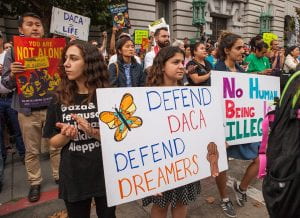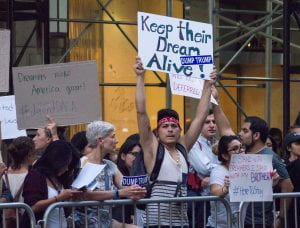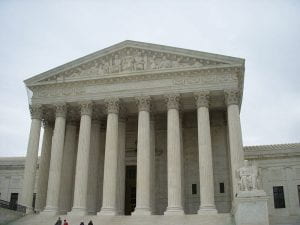“Justice prevailed this week” was the statement made at a modest staff meeting. Justice prevailed? Considering everything going on, it’s hard to see justice prevailing. “With the two Supreme Court rulings.” Ah, yes, the DACA and LGBTQ+ cases. “Would you be willing to write a blog piece on how these connect to the Vincentian story?”
Yes. The requestor knew that I possess a keen interest in Vincentian history and values and in trying to discern how those play out in twenty-first-century America and that I could write about it. What they probably didn’t know was that I have had the experience of a former boss responding to a 2008 announcement that I was getting married to my female partner by saying, “Wonderful news! Congratulations! You do realize that since you work in ministry, you could lose your job if someone decides to make you the focus of a morals campaign, right? But don’t worry, DePaul would find you another job internally!” I also have a spouse who came out as transgender last year. I watched them navigate the process at their workplace, anxious about the reaction of managers and colleagues, and wondering if they had trashed their hopes for a promised promotion despite workplace protections. It all seemed to rely on the good will of others, a seemingly shaky foundation in a time of partisan divide and culture wars.
What I have not experienced is being a vulnerable DACA recipient, nor their family and loved ones, relieved at yet another reprieve but having to listen to the President of the United States tell his supporters, “People don’t understand, but we actually won on DACA yesterday…. We actually won, because [the court] basically said, ‘You won, but you have to come back and redo it.’” Once again, their futures in the U.S. which I believe should be assured are in doubt, despite studies showing what a strong contribution immigrants in general and DACA recipients in particular make to this country.
Regardless of my personal relationship to the LGBTQ+ or DACA recipient communities, though the Court decisions made me reflect on both, the question remains the same: how does the justice of the recent Supreme Court decisions relate to the Vincentian story? Broadly I see the connection around the value of human dignity, a Vincentian commitment to justice for all people, and a commitment to working for justice in community. On a personal level, I can view the rulings through the lens of my twelve-year experience at DePaul.
President Esteban’s recent statement on the Supreme Court DACA and LGBTQ+ rights decisions reads, “Our commitment to DACA students is rooted in our Vincentian mission to serve marginalized individuals and groups. This case, and other actions at America’s borders, sought to demean and dismiss their inherent value to American society and our community…. DePaul strives to be an inclusive community that draws on diversity as a source of learning and understanding. We are encouraged by this week’s momentous decisions, and we continue to be inspired by the legacies of St. Vincent de Paul and St. Louise de Marillac, who instilled in us a belief in the God-given dignity of all people.”(1)
 DePaul University has long supported Dreamers and DACA recipients, and this commitment can be seen in the context of its mission statement: “Motivated by the example of Saint Vincent, who instilled a love of God by leading his contemporaries in serving urgent human needs, the DePaul community is above all characterized by ennobling the God-given dignity of each person. This religious personalism is manifested by the members of the DePaul community in a sensitivity to and care for the needs of each other and of those served, with a special concern for the deprived members of society. DePaul University emphasizes the development of a full range of human capabilities and appreciation of higher education as a means to engage cultural, social, religious, and ethical values in service to others.”(2) DePaul has very publicly stood for undocumented students, providing resources, support, educational opportunity, and public affirmation in living out its mission of upholding human dignity.
DePaul University has long supported Dreamers and DACA recipients, and this commitment can be seen in the context of its mission statement: “Motivated by the example of Saint Vincent, who instilled a love of God by leading his contemporaries in serving urgent human needs, the DePaul community is above all characterized by ennobling the God-given dignity of each person. This religious personalism is manifested by the members of the DePaul community in a sensitivity to and care for the needs of each other and of those served, with a special concern for the deprived members of society. DePaul University emphasizes the development of a full range of human capabilities and appreciation of higher education as a means to engage cultural, social, religious, and ethical values in service to others.”(2) DePaul has very publicly stood for undocumented students, providing resources, support, educational opportunity, and public affirmation in living out its mission of upholding human dignity.
I have also experienced DePaul being inclusive and just (though not always perfect) from an LGBTQIA+ perspective. I recall being at the “Out There” conference for scholars and Student Affairs personnel supporting LGBTQ Issues on Catholic Campuses, hosted by DePaul. The event had raised the ire of some who were waging a national campaign to say DePaul could not support this conference and still call itself “Catholic.” As I recall, then President Holtschneider said something along the lines of, “When other local universities had religious quotas, DePaul did not have religious quotas. When most schools restricted women to teaching or nursing, DePaul had general matriculation, and now we have same sex partner benefits, an LGBTQ Studies program, and are meeting an obvious practical need with this conference. We want our professional staff do the best job they can to support the many LGBTQ students who attend our school. It’s not particularly trail blazing stuff. The rest of you will catch up.” This, to me, was Vincentian pragmatism—meeting people where they are and attending to their human dignity while also practicing justice by challenging unjust understandings and policies.
So what must be done? What is the Vincentian story both here and beyond DePaul?
In writing about Frédéric Ozanam last year, the President of the Society of St. Vincent de Paul, Renato Lima de Oliveira, wrote, “what is our understanding of justice? As members of the worldwide Vincentian Family justice consists of service on behalf of those people who are poor and of the promotion of much needed structural change in present day society. Social justice implies a willingness to engage in a struggle for the rights of those persons who have been excluded from participation in Society. This understanding of justice was, in fact, one of the primary virtues of Frédéric Ozanam.”(3)
In writing about advocating for justice, my colleague and University Ombudsperson, Craig Mousin noted, “Vincent was ahead of his time and saw the importance and necessity of providing just wages and medical benefits for his employees. Ozanam and others provided spiritual and intellectual leadership in pinpointing resolutions of social questions through more just treatment of working people.”(4) The Vincentian Family of organizations is rightly focused on justice as well as charity, and systemic change is included as a core value.
 Justice did prevail against naked injustice, in my opinion, with the recent Supreme Court decisions. Many, many people have worked and will continue to work on behalf of justice for these two groups of people who often face marginalization, threats to wellbeing, and dehumanization. They work knowing that individual wins are to be celebrated and “Jubilee” moments recognized and savored. Yet, like institutionalized racism, the structural oppression countering the realization of justice for undocumented people and LGBTQIA+ community members must be named and seen as alive and well and working for justice must be done in community.
Justice did prevail against naked injustice, in my opinion, with the recent Supreme Court decisions. Many, many people have worked and will continue to work on behalf of justice for these two groups of people who often face marginalization, threats to wellbeing, and dehumanization. They work knowing that individual wins are to be celebrated and “Jubilee” moments recognized and savored. Yet, like institutionalized racism, the structural oppression countering the realization of justice for undocumented people and LGBTQIA+ community members must be named and seen as alive and well and working for justice must be done in community.
Vincent and Louise established communities for the sake of mission that still exist today. Ozanam’s Society of St. Vincent de Paul went from a college-student’s dream to a modern organization with 800,000 members in 140 countries. DePaul students who participate in service and justice activities using the “Vincentians in Action” reflection model take part in community mobilization and action. They gain critical Vincentian values of being in mutual relationship with people on the margins, working together, maximizing one another’s gifts from a place of humility, and even through simple actions serving the common good to the greatest extent possible. Communities share in celebration and in pain, both when justice prevails and when it does not.
Looking at the recent Supreme Court decisions through a Vincentian lens gives me hope and a sense of broader community and possibility. This moment is tied to justice and injustice worldwide, and it provides meaning to the work I do for justice. It is a reminder that the work for justice is never finished in our imperfect world, but that there are still times that call for celebration and building strength for our continuing work.
Written by – Katie Brick
1) A. Gabriel Esteban, Ph.D., Statement from DePaul University president on U.S. Supreme Court decisions affecting DACA and LGBTQ+ rights, 18 June 2020, at: https://resources.depaul.edu/newsroom/news/press-releases/Pages/statement-from-university-president-on-supreme-court-decisions.aspx
2) DePaul University’s Mission Statement, at: https://offices.depaul.edu/mission-ministry/about/Pages/mission.aspx
3) Renato Lima de Oliveira, Justice and the Members of the Vincentian Family, 19 November 2019, at: https://famvin.org/en/2019/11/25/justice-and-the-members-of-the-vincentian-family/
4) Craig B. Mousin, “Vincentian Leadership—Advocating for Justice,” Vincentian Heritage 26:1 (2005), 270. At: https://via.library.depaul.edu/vhj/vol26/iss1/14/

Thank you Katie for your input.
Pascale Kichler
Well done, Katie. Indeed, recent events give us hope that there is movement happening toward the reality of spreading human dignity and human rights to all people by focusing on the particular needs of each oppressed group. Thanks for taking up the challenge to express how our Vincentian vision and values support to the movement.
Thanks for your comment, Pat, and the work you do with the Hay Project and at SPS!